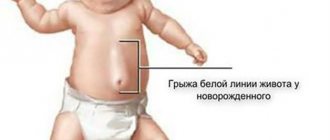Author: MC "Diamed-Tula"
A baby cannot cry without a reason. Often, children's crying occurs due to the appearance of paroxysmal pain in the tummy - colic. They appear due to increased gas formation, which results in intestinal spasm.
According to statistics, already in the 3rd week of life, 55-75% of newborns suffer from colic. They can last up to 4 months and then gradually disappear. Bloating and cramping are usually observed in the late afternoon, after evening feedings. It all starts with the child becoming restless half an hour after eating. The baby presses his legs to his stomach, cries angrily, turns red or pale, and clenches his fists.
Causes of colic
Spasms can appear for various reasons. Only a doctor can determine them after a comprehensive examination. The baby’s digestive system has its own physiological characteristics; due to its immaturity, food intake provokes unpleasant symptoms.
The appearance of colic is influenced by:
• improper functioning of the gastrointestinal tract due to imperfections of the endocrine and nervous systems; • lack of enzymes that are necessary for food processing; • allergic reactions to formula or components of mother's milk; • disturbance of intestinal microflora; • air entering the esophagus due to poor feeding technique.
Stressful situations can also cause cramps. A nursing mother is advised to give up gas-forming products, follow a diet, and refrain from smoking.
The pain usually goes away quite quickly. You can talk about the presence of lactase deficiency or the development of an intestinal infection if bloating in the abdomen and pain symptoms last more than 3 hours. If complications occur, the baby requires medical attention. The specialist will make a diagnosis and give recommendations if there are any unpleasant sensations. About 5% of babies experience serious illness due to colic.
The medical doctor offers to make an appointment with a general practitioner. A full range of diagnostics and treatment of urological diseases in Tula. Tel. for recording.
What can you eat while breastfeeding?
- Dairy and fermented milk products. They are rich in proteins and other substances that the female body actively uses during lactation, including for milk production. Fermented milk products contain lacto- and bifidobacteria, which are necessary for the formation of the child’s digestive system. In fact, fermented milk products are the main source of calcium, the need for which is very great for a child in the first year of life, because the baby is constantly growing! Kefir, fermented baked milk, cottage cheese and cheese must be present in the diet of a nursing woman. And you should temporarily avoid smoked cheeses and yoghurts with fillings.
- Meat (rabbit, beef, turkey), lean fish. They are sources of protein necessary for the construction of tissues and cells, the formation of antibodies that protect the body from bacteria and viruses. These products contain a lot of amino acids, which are required for building body cells, as well as iron, vitamins A, D, which strengthen bones and allow the child to avoid rickets. Fish contains a lot of phosphorus - the main building material of all cells. It is recommended to consume boiled, stewed or steamed meat and fish.
- Vegetables. Cauliflower, broccoli, zucchini, cucumbers, carrots, potatoes - all these vegetables are allowed during breastfeeding. First of all, vegetables are a source of plant proteins, carbohydrates, and fiber. But in addition, they are rich in vitamins and minerals. For example, green vegetables contain folic acid, which is needed in large quantities for active growth and proper hematopoiesis.
- Fruits and berries are the most important source of carbohydrates, vegetable proteins, fiber and vitamins. Apples are record holders for fiber content, which improves the functioning of the gastrointestinal tract, as well as iodine, magnesium, and calcium. Peaches are rich in rare microelements, such as manganese and copper, which are necessary for the proper growth of the baby. Beta-carotene, which is abundant in apricots, is required for the formation of immunity in a newborn. Bananas are the main supplier of the amino acid tryptophan, which is actively consumed during joint growth. And besides, fruits and berries are simply delicious and therefore lift the spirits of a nursing mother, which is also very important.
- Porridge. They supply the body with complex carbohydrates, which are responsible for energy production, fiber, vitamin B (required by the nervous system), vitamin E (needed by the skin, bones). It is not recommended to eat rice if the child has problems with bowel movements.
- Vitamin and mineral complexes. When breastfeeding, vitamins and minerals are consumed at a high speed and in large quantities, so you should not expect that you will be able to provide your baby with all the necessary micronutrients from food alone. To reduce the baby’s risk of anemia, rickets, delayed development and other consequences of vitamin deficiency, a nursing mother should take specialized vitamin complexes. For example, Pregnoton Mama, which contains 15 vitamins and minerals, as well as Omega-3 (detailed information about the product can be found here).
Prevention of colic
Colic will be less pronounced if you follow all the recommendations:
- Follow feeding technique. When feeding, it is important to position the baby correctly so that he does not swallow air. You should not change the formula for a formula-fed baby without consulting your pediatrician. The doctor will be able to select the optimal composition of baby food for a baby who has problems with the gastrointestinal tract. After feeding, you need to wait for burping; for this, it is recommended to hold the baby upright for some time.
- Do not overfeed your child. The feeding schedule should be strictly followed. Mothers whose children are bottle-fed must strictly adhere to dosages and follow food preparation rules. Recommendations for feeding children of different ages can be obtained from your pediatrician.
- Place on tummy before feeding. This position not only improves digestion, but also helps strengthen the abdominal muscles. The time should be increased gradually, it is better to start with 2-3 minutes.
- A nursing mother should not include potential allergens in her diet. These include citrus fruits, dairy products, seafood, eggs, chocolate. Also exclude gas-inducing and laxative foods, spicy and fatty foods. Following a diet significantly reduces the severity of colic.
- Create a calm atmosphere. It is recommended not to turn on noisy devices and talk in a low voice. Mom can play calm classical music, a recording with monotonous sounds (heartbeat, rustling of a fan, sound of the surf), sing a lullaby, tell a fairy tale or story. The parent's voice gives the baby peace of mind and promotes deep sleep.
You can ease the release of gases after eating if you do a light massage after 35-60 minutes and stroke your tummy clockwise. After this, bend and straighten the legs, repeat several times. Heat also helps relieve colic. You can apply a special heating pad or a warm diaper to the baby’s belly. In some cases, a warm bath with decoctions of soothing herbs helps calm the baby, and water heated to body temperature stops spasms.
What foods can cause colic in a newborn?
When planning your daily diet, exclude foods that cause colic in newborns. These include:
- Whole milk. Lactose contained in the composition is a substance that causes colic in newborns due to gas formation. This product is poorly absorbed by the baby’s body and can cause, in addition to bloating, allergic reactions. In your diet, it is better to replace milk with kefir, yogurt, and fermented baked milk.
- Hot sauces. Ketchup, mayonnaise, and mustard cause intestinal irritation, which causes colic in newborns, so it is not recommended to include these products in the menu of a nursing woman.
- Black bread. The enzymes included in the composition lead to gas formation. When breastfeeding, it is better to replace this product with whole grain bread.
- Legumes. Lentils, corn, beans, peas are foods that cause colic in newborns. Instead, it is better to include other protein-containing foods in a nursing mother's diet. For example, cottage cheese, soy cheese, low-fat fish.
- Raw vegetables and fruits. Flatulence is caused by fiber, and some fruits can cause an allergic reaction. Therefore, any vegetables and fruits should be heat treated.
- Sweets. Chocolate and candies are among those foods that cause colic in children. So it’s better to give up your favorite treats. Carbonated drinks. Not only Fanta or Coca-Cola can cause colic in newborns, but also ordinary mineral water with gas. So you should accustom yourself to drinking weak tea or herbal infusions.
Treatment of colic
Medicines are an effective remedy for intestinal colic. The pediatrician will help you choose the right medicine and determine the dosage. You can buy various anti-colic remedies in pharmacies. Most often, young children are prescribed the following drugs:
- "Growwith Dill Water";
- "Sub Simplex";
- "Bobotik";
- "Espumizan L";
- "Espumizan baby."
Some of the medications may be contraindicated for a child; there are additional means to eliminate discomfort. You can buy gas tubes in pharmacies; many parents prefer disposable rectal tubes "Windy" because of their ease of use. They will relieve the baby of accumulated gas, help prevent increased gas formation, relieve pain and eliminate bloating. Before use, consult a pediatrician. Proceed according to the instructions.
Does a baby get colic from sweets?
Do sweets cause colic?
A nursing mother should not overuse desserts, not even because of their calorie content. The baby can be harmed by dyes, preservatives and other chemical additives contained in confectionery products. They will cause a severe allergic reaction in the baby. Moreover, sweets become a real test for the baby’s digestive system. Carbohydrates are difficult to digest, and some foods, especially chocolate and yeast dough, contribute to increased gas formation. As a result, the baby may develop colic.
However, in small quantities, sweets are healthy, because they promote the production of serotonin, a hormone that relieves fatigue, keeps the body in good shape, and is responsible for healthy sleep. This is especially important for those struggling with postpartum depression. So sometimes you can treat yourself to desserts. The main thing is to choose the right products that will not harm either you or your baby.
Allowed sweets
Biscuits and oatmeal cookies are considered the safest for mothers and babies . They contain useful microelements and rarely cause food allergies in the baby. It’s better to cook them yourself to be sure of the quality of the product.
Without any worries, you can treat yourself to meringues and white marshmallows. They are quite easy to prepare at home, and if you do not overuse them, your baby will not have tummy problems.
Don't deny yourself a piece of charlotte. Flour, sugar, eggs and green apples should not cause a negative reaction in the baby. If cakes and pies, especially store-bought ones, remain prohibited until the end of breastfeeding, then you can easily afford charlotte. Nursing mothers can eat oriental delicacies : Turkish delight, halva and kozinaki. They contain acids that improve blood circulation, relieve fatigue, and have a beneficial effect on the condition of hair and nails. Just eat them rarely, in small portions - 50-100 grams per day, and only if the baby is not prone to food allergies.
When your baby is six months old, you can treat yourself to chocolate. However, you need to understand that it is a strong allergen and is difficult to digest. Therefore, for the first time you need to try 25 grams, that is, one “square”, and monitor the baby’s reaction throughout the day. If he doesn't develop a rash or have problems with bowel movements, you can increase the portion. You are allowed to eat 50 grams of dark chocolate without additives a couple of times a week.
We follow the rules
To be calm about your own health and the condition of your baby, include sweets in your diet correctly:
- Don't eat too many sweets at one time. Introduce them into your diet after your baby turns three months old. After six months, you can include not only chocolate in the menu, but also homemade jam from apples, pears, apricots or peaches.
- Milk, honey, products with preservatives, dyes and flavorings remain prohibited.
- For the first time, try a small piece of the treat, and then monitor the baby’s condition for two days. If he feels good, calmly increase the portion.
- Introduce new foods into your diet gradually so that you can easily monitor your baby's reaction.
- Try to prepare sweets yourself. If this is not possible, carefully study the composition of the product and do not forget about the expiration dates.
- If you crave sweets too often, try to “trick” your body: eat dried fruits (dried apples, apricots and plums). They are easily absorbed by the body, normalize digestion and are completely safe for the baby.









